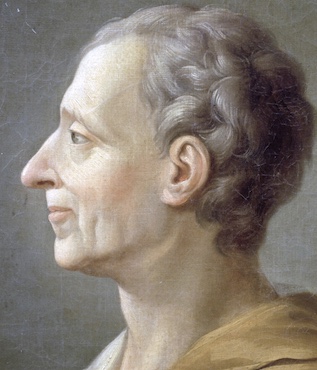On this date in 1689, political philosopher Charles-Louis de Secondat, Baron de Montesquieu, was born near Bordeaux, France. Educated at Catholic schools, Montesquieu earned his law degree at the University of Bordeaux in 1708. He inherited his father’s estates in 1713. In 1716 he became a titled baron. He married a practicing Protestant woman and had three children but immersed himself in work and scholarship.
For about a decade he presided over the criminal division of Bordeaux’s governing council, resigning in 1725. His irreverent spoof Persian Letters, published anonymously in 1721, was banned by the Catholic Church. The novel, pessimistic but amusing, was written as a correspondence between two Persian Muslims commenting on the peculiar customs of Europe. Aware of the identity of the author, Catholic officials attempted to bar Montesquieu from the Academie Francaise but he was eventually admitted in 1728.
His opus, The Spirit of Laws (1731), promoted a republican democracy and the separation of powers, specifying “three estates” (legislative, executive and judicial) and called for the abolition of slavery and of religious persecution. It was also banned by the church. It remained in print and was a major inspiration to James Madison and the American founders, who adopted a Constitution closely patterned after Montesquieu’s political philosophy.
The most radical notion in his work was the omission of a role for clergy in government. The Spirit of Laws also found its way into the Index of Forbidden Books. A classical deist of the Enlightenment, Montesquieu believed only in a nature’s god, not a personal deity. (D. 1755)


